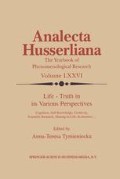Abstract
We have been trying to take advantage of the phenomenological method in order to explicate the classical Hindu text and answer the inspiring question of whether the notion of atman-brahman might have any implication for phenomenology. As is widely known, atman-brahman is not only described as a conscious being, but it is said to be a pure consciousness. The latter — treated as pure subjectivity — is an authentic, autotelic being — brahman. “Oncoming” layers or circles of consciousness are equivalent to subsequent stages of reduction. These are the counterparts of particular states, modi of consciousness (awareness). The noemas seem to be real, coherent and active on a given temporal stage until one investigates their nature, until “the systematic, essentialistic eidetic analysis is achieved.” As will be stressed (in this text), the subsequent stages of reduction concern the very object which turns out to be a pure subject — atman. Thus all stages of the “appearing” of the world must be constituted by a conscious subject. The latter intentionally aims at something transcendent, “going” deeper into the very layer of constitution itself. It seems that all acts are anchored into something deeper; one may say that consciousness looks for its “interior,” makes circular movements which eventually lead it to the level where a subject intentionally aims at itself.
Access this chapter
Tax calculation will be finalised at checkout
Purchases are for personal use only
Preview
Unable to display preview. Download preview PDF.
Notes
Upanishads, transi. P. Olivelle, Oxford University Press, 1996, VIII.7.1.
Ibid. VIII.7.4.
Edmund Husserl, Ideas, transi. W. R. Boyce Gibson, London, 1931, p.153
c.t. 165.
Ibid. p.165.
Upanishads, op.cit.,VIII 10. 1–2
Ibid. VI11. 11.1
Edmund Husserl, op.cit. p.379
c.t. 392
c.t. 172
c.t. 220
Upanishads op.cit.VIII.12.1–3
Author information
Authors and Affiliations
Editor information
Editors and Affiliations
Rights and permissions
Copyright information
© 2002 Springer Science+Business Media Dordrecht
About this chapter
Cite this chapter
Kudelska, M. (2002). An Attempt at a Phenomenological Description of the Self-Knowledge Process in the Chandogya Upanishad. In: Tymieniecka, AT. (eds) Life Truth in its Various Perspectives. Analecta Husserliana, vol 76. Springer, Dordrecht. https://doi.org/10.1007/978-94-017-2085-4_4
Download citation
DOI: https://doi.org/10.1007/978-94-017-2085-4_4
Publisher Name: Springer, Dordrecht
Print ISBN: 978-90-481-5847-8
Online ISBN: 978-94-017-2085-4
eBook Packages: Springer Book Archive

